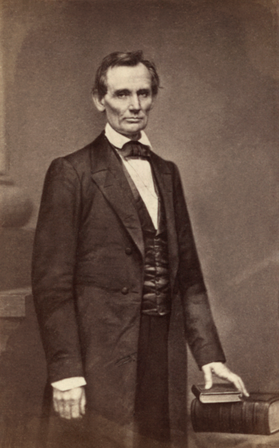 He resolved to stay and pay what he owed. Lincoln joked that he had his own “National Debt.” It took him several years, but he paid it all back, every penny. “His straightforward conduct in this and other dealings earned him the nickname ‘Honest Abe,’” wrote Lincoln historian Benjamin Thomas. As a lawyer in Springfield, Illinois, he always tried to treat people fairly. Once a client sent him $25 for drawing up some papers. “You must think I am a high-priced man,” Lincoln wrote him. “You are too liberal with your money. Fifteen dollars is enough for the job.” He sent $10 back. Another time, he discovered that one of his law partners had charged $250 for a case representing a young woman who was mentally disabled. “Lamon, that is all wrong,” he said. “The service was not worth that sum.” He made his partner to give half the money back. “That money comes out of the pocket of a poor, demented girl, and I would rather starve than swindle her in this manner,” he insisted. Integrity mattered. “The Lincoln of reality seems to match the Lincoln of myth in this regard: that he tried to be scrupulously honest and honorable in his personal dealings, and cared a great deal about his reputation for being so,” wrote Lincoln scholar William Lee Miller. Lincoln, of course, was a politician, and he could be crafty. No doubt about that. But as a legislator and as president, he tried hard to stick to his word. “I think it cannot be shown that when I have once taken a position, I have ever retreated from it,” he told the abolitionist Frederick Douglass. Douglass met with Lincoln in the White House during the Civil War to discuss policies regarding, among other matters, black soldiers. After his visit, Douglass told an audience: “Now, you will want to know how I was impressed by him…. He impressed me as being just what every one of you have been in the habit of calling him—an honest man.” Some people thought Lincoln would never go through with his pledge to sign the Emancipation Proclamation. It was a politically risky act. “I trust to prove true to a principle which I feel to be right,” he said, and sign it he did. “I never, in my life, felt more certain that I was doing right, than I do in signing this paper,” he said before he wrote his name. When the war went badly, his critics called him a confused, incompetent rube. But his allies, including millions of Americans, sensed that he was a good, decent man. And that helped them know that the cause they were fighting for was good and decent. Lincoln’s log-cabin-to-White-House story is still one of the most compelling in all of American history. So let’s hear it for Honest Abe this February 12, his birthday, and all this month. He’s a great example for young people. Let’s make sure they know Honest Abe really was just that. John T.E.Cribb is the author of Old Abe, a novel about Abraham Lincoln, forthcoming in Fall 2020. He is co-author (with Bill Bennett) of The American Patriot's Almanac and The Educated Child. To read more from Telling Our Stories, visit our Blog Archives page. Comments are closed.
|
AuthorWrite something about yourself. No need to be fancy, just an overview. Archives
July 2024
Categories |
